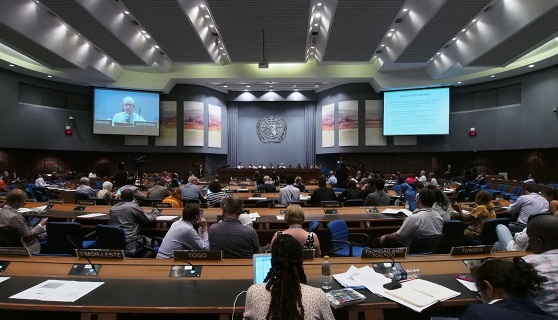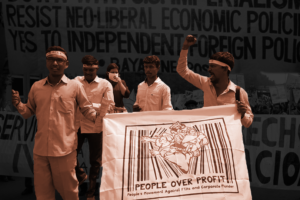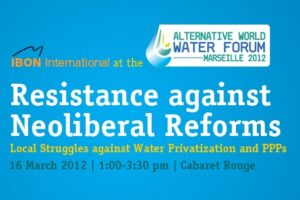IBON International Updates #04
[[{“type”:”media”,”view_mode”:”media_large”,”fid”:”65″,”attributes”:{“alt”:””,”class”:”media-image”,”height”:”178″,”style”:”width: 310px; height: 178px; margin: 10px; float: right;”,”typeof”:”foaf:Image”,”width”:”310″}}]]
(BANGKOK, Sept. 2, 2012) — With only three more days left at the Bangkok informal additional sessions, there are a number of outstanding issues in which developed and developing country negotiators appear to be reading the same book, but one that has different versions and editions. And if these differences weren’t enough, they are not all on the same page, to say the least.
Take for instance the open-ended informal consultation by H.E. Mr. Abdullah Bin Hamad Al-Attiyah, the President Designate of COP 18/CMP 8, on the expectations of Parties and observers for the Doha Climate Conference set to be held in end-November in Qatar.
Mr. Abdullah Bin Hamad Al-Attiyah started the consultation by saying that we
are close to concluding an important milestone on the road to Doha. He said that in the Doha outcome, we would want to see balanced progress on all tracks—referring to the Ad hoc Working Groups on Long-term Cooperative Action (LCA), Kyoto Protocol (KP), and the Durban Platform (ADP). He recognizes that this will not be easy, and that there are important political choices to be made. He said that overall, there is “optimism and an understanding for the need for compromise to preserve the multilateral system for the future generations.”
Algeria, speaking for the G77/China, recognized that important progress has been made in the negotiations, and there is a need to ensure a smooth transition of work within the three ad hoc groups.
Nauru, on behalf of the Alliance of Small Island States (AOSIS), said that a legally binding second commitment period under the Kyoto Protocol (2CP) with environmental integrity is key to having a successful outcome in Doha. Nauru further elaborated that the 2CP should have a period of five years, and should respond to the upcoming 5th report of the Intergovernmental Panel on Climate Change (IPCC) with a new set of global ambitions. There must be agreements on the following areas: (a) a timeframe on global peaking; (b) a review of the 2-degree temperature increase target, and strengthening it further to a target of well below 1.5-degree rise; (c) on scope and modalities so as to ensure scientific integrity of review; (d) establishment of international mechanisms to address loss and damage, which is even more an urgent priority in the light of the low ambition currently on table.
Switzerland, speaking for the Environmental Integrity Group, said that Doha should be an important milestone in the longer process of strengthening the international climate change regime. It has three building blocks, to wit: (a) 2CP; (b) successful conclusion of the work of AWG-LCA; and (c) Doha should reflect that we are on track the ADP and we are committed to make it successful.
Australia, for the Umbrella Group and supported by Kazakhstan and Ukraine, said it looks forward to a Doha outcome that balances progress and that the focus should be on agreements essential to launch the 2CP and “avoid discussions on areas where consensus cannot be had.”
Swalizand, on behalf of the African Group, defined what to them is a successful Doha outcome. It should deliver ambitious outcomes negotiated in COP 17; an ambitious 2CP under the Kyoto Protocol; an understanding that Annex 1 countries will take on legally binding commitments (without loopholes); and that 2CP will be in force by January 2013 without gaps between the 1st and 2nd commitment periods, in accordance with the Bali Action Plan. Swaziland reminded everyone that the Durban outcome was a package, and Parties cannot just “pick and choose” what they want from the package.
The European Union stressed that all Parties have a responsibility to make Doha a success. It called for a 2nd commitment period under Kyoto Protocol with the “broadest participation possible,” and for domestic policy makers to begin preparing the policy inputs needed to see this through.
Gambia, on behalf of the 48-country group of Least Developed Countries, stressed the need to ensure that we successfully conclude AWG, KP, LCA and that there is no gap between 1st and 2CP. It said that if we cannot agree on remaining issues on KP, the balance we are expecting in Doha is going to be “very difficult.” In addition to the issues expounded on by the AOSIS, he also mentioned unresolved debates around Long Term Finance (LTF), scaled-up pledges for the Green Climate Fund, and mid-term finance to complement the LTF.
Egypt supported the statements of the G77/China, Africa Group and the group of like-minded developing countries. It added that the outcomes must be grounded on the principles of equity and common but differentiated responsibilities (CBDR). It said that it “cannot accept unambitious outcomes, but it seems some countries are unwilling to negotiate targets,” and went on to say that developed countries need to be carbon neutral or even carbon negative, but the loopholes threaten to wipe out even the low pledges on the table.
The Philippines, speaking for Algeria, Argentina, Bahrain, Bolivia, Brazil, China, Comoros, Cuba, Democratic Republic of Congo, Dominica, Ecuador, Egypt, El Salvador, Ghana, India, Iran, Iraq, Jordan, Kuwait, Lebanon, Libya, Malaysia, Maldives, Mali, Mauritania, Nicaragua, Pakistan, Paraguay, Philippines, Saudi Arabia, Sri Lanka, Sudan, Thailand, Venezuela, and Yemen, said that COP 18 is the last possible opportunity to save the Kyoto Protocol second commitment period, but the prospects of having 2CP or second commitment period with weak targets could endanger any progress made in other elements of the Durban Package. The “balanced package” is in jeopardy, severely hampered by the lack of progress in unresolved issues. It further stressed that any agreement cannot be binding unless we are able to differentiate on the basis of equity and CBDR.
Singapore supported the statements made by G77/China and AOSIS and identified three main ingredients for a successful Doha outcome: (a) a Doha amendment to the Kyoto Protocol; (b) successful closure of the AWG-LCA and an initial consolidation of the ADP work plan; and (c) a transparent and inclusive process at every step (to the last hour and minute) of the Doha COP.
The Chair opened the floor to other interventions from observers.
A representative of business/industry said that it was important to engage business more fully in pursuit of sustainability. Business participation, i.e., enhancing business and incentivizing investments can be considered part of the foundation for post-2020 work. He enjoined Parties to brainstorm with the business/industry sector on how international processes can take advantage of innovations and the responsible perspectives that businesses can provide.
Meanwhile, a representative of environmental organizations said that the Arab region is not historically recognized for having a progressive approach in climate negotiations. He suggested that a direct involvement of the Qatari royal family and for Qatar to put in concrete numbers for mitigation would send positive signals to the international community.
One book, different versions and editions, and they’re all not on the same page. ###
______________________________________________________________________
Photo credit: Undersecretary Segfredo Serrano of the Philippines' Department of Agriculture


